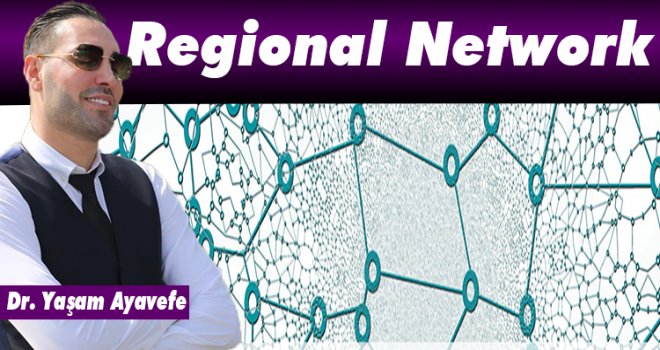Regional Network

The first and most obvious source of inquiry is the territoriality of the network.
It is necessary to examine the two main issues in the interconnection resource of capacity and information sharing, and in reliability, efficiency and scalability.
It doesn't make much sense to build an Internet that is reduced to a national territory with a device guaranteed by decentralization.
Thus, the Internet is the tool of global connectivity that overturns existing regulatory frameworks built on the legitimacy of regions.
The state cannot control any kind of information exchange with its citizens that escapes its sovereignty. Therefore, any regulation regarding information via the Internet can be avoided.
Tools are needed to circumvent any restrictions on information use. The Internet does not make government intervention illegitimate. But it makes them ineffective or at least difficult to operate.
A major restriction bypass that previous technologies did not allow is possible today. This is not the first time in history that technology has challenged legal norms.
In practice, however, service and content providers place their activities in regions where the standards that best suit their preferences are imposed. The Internet tends to organize a conflict and direct competition between these standards.
Competition between standards can therefore lead to alignment on the lowest common denominator. For example, there is a decision to exempt e-commerce from tax.
This territoriality is limited to certain activities. (For example, when it comes to electronic commerce on tangible resources)
But this competition affects all standards related to content. It concerns a wide area from the use of intellectual property rights to the protection of personal data.
The effect of this competition for rights for everything related to information activities creates common law principles. Despite the possibility of defining international conventions, it carries a deep instability in existing legal systems.
Fiscal regulations explain the rationale for developing common restrictive standards. States are always ready not to comply with these international standards that limit their effectiveness in order to promote their economic development.

On the other hand, the ability to agree on precise standards beyond a few basic principles is limited. Because different rights reflect sometimes contradictory understandings of historical and philosophical traditions.
The probability of reaching operational agreements on standards to be applied internationally is relatively low, as evidenced by the differences in freedom of expression or use of personal data between Europeans and Americans.
Cross-Industry Network
The Internet tends to be the technological platform for exchanges. It also includes differentiation of arrangements between telecommunications, audio-visual, press, for the storage and processing of all information, whatever its form and content.
Publishing, etc., which the previous technological foundations had to impose. is also questioned.
For example, the differentiation of regulations in telecommunications and audiovisual was largely explained by the differentiated economies of various technical networks that had neither the same functionalities nor the same cost constraints.
The allocation of business licenses in the audiovisual sector was explained by the restriction of managing a rare resource, namely radio frequency.
The differentiation of legislation in terms of content control between audiovisual and written word is due to the technical difficulty of arranging filtering in the mass media according to the recipients.
Today's internet, telephone, radio and television broadcasting etc. The possibilities for bypassing remain limited, as traditional network services such as Therefore, the regulations in force remain applicable.
The fact is that the development of the high-speed Internet and a number of complementary technologies such as electronic books (e-books) or print-on-demand techniques will transform the Internet into a potential medium for the dissemination and exploitation of most information content.
This technical change will have two types of impact:
- First, to make traditional regulations partially dysfunctional
- Second, to make some regulations partially illegitimate.
Regarding the territoriality issues mentioned above, the destabilization of the existing regulatory framework is not simply due to the possibilities of overcoming it.
It also comes from the removal of certain restrictions. For example, there is a need to manage a limited hertz spectrum to broadcast audiovisual programs or to make feasible the distribution network of cultural products that connects the region.
Dr.Yaşam Ayavefe
-
 Küfür ediyor ve siyasi yorumlarıyla tepki çekiyor: Musk'ın sohbet botu Grok nede..
Küfür ediyor ve siyasi yorumlarıyla tepki çekiyor: Musk'ın sohbet botu Grok nede..
-
 YDP, Gençlik Şöleni düzenliyor: Gençler siyasete katılıma teşvik edilecek..
YDP, Gençlik Şöleni düzenliyor: Gençler siyasete katılıma teşvik edilecek..
-
 ABD, Heyet Tahrir Şam'ı terör örgütü listesinden çıkardığını duyurdu
ABD, Heyet Tahrir Şam'ı terör örgütü listesinden çıkardığını duyurdu
-
 ARIKLI: GENÇLERE MADDİ MANEVİ HER TÜRLÜ DESTEK SAĞLANMALI
ARIKLI: GENÇLERE MADDİ MANEVİ HER TÜRLÜ DESTEK SAĞLANMALI
-
 Milli sporcumuz Azra Avcı U14 Türkiye Şampiyonu oldu!
Milli sporcumuz Azra Avcı U14 Türkiye Şampiyonu oldu!
-
 İEZB Başkanı Serkan Kırmızı’dan KIB-TEK’e Sert Tepki: Bu Bir Enerji Beka Sorunud..
İEZB Başkanı Serkan Kırmızı’dan KIB-TEK’e Sert Tepki: Bu Bir Enerji Beka Sorunud..
-
 Othello Folklör Master ekibi Bosna'daydı
Othello Folklör Master ekibi Bosna'daydı






